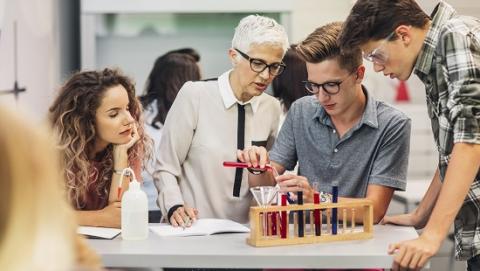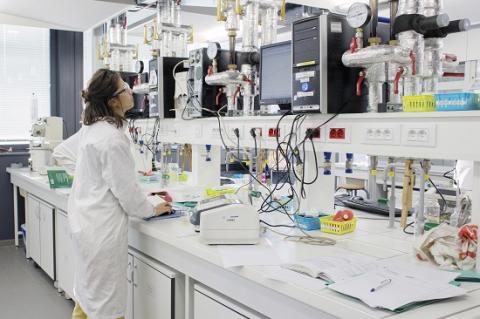
External Aggregation in Chemistry
The aggregation of physics and chemistry option is an entrance examination for teaching at a lycée, CPGE, BTS, IUT or university. The year of preparation for this demanding examination enables students to utilize their knowledge in chemistry (Master's level and above) and physics (L2 level), with the aim of learning how to impart knowledge. In particular, the aim is to develop didactic skills through pedagogical analysis and practice in the competitive examination tests: the chemistry lesson, the experimental physics lesson and the chemistry composition. The course enables students to complete the components of their subject, verify and consolidate what they have already learned, and learn how to transmit it with pedagogy, rigor, clarity and precision in the context of an oral or experimental presentation of a given level (or complexity).
Organization
The M2 Chemistry program prepares students for the external aggregation competitive examination in Physics and Chemistry (Chemistry option). It is run jointly by three institutions: ENS Paris, Université Paris-Saclay and Sorbonne Université. This is a diploma course: the jury will deliberate early enough to allow the "aggregation preparation" master's degree to be awarded before the aggregation eligibility list is published.
The "aggregation de chimie" course is organized around two main periods:
- the first period focuses on preparation for the written exams and the specific format of the oral exams. This is an opportunity to supplement and deepen subject knowledge in chemistry and physics, by solidifying what has been learned each week through assignments based on the competition subjects. The competitive examination demands a large amount of experimental training in the various fields of chemistry (organic, inorganic, general) and physics. Every week, students are given the opportunity to take part in practical work. During these sessions, students learn to isolate the relevant phases for a pedagogical demonstration.
- the second period focuses exclusively on preparation for the oral exams. Every day, students are placed in the real-life conditions of the specific competitive exams: the chemistry lesson, the physics experimental lesson and the chemistry assembly. This is the period when students must mobilize all their disciplinary knowledge to construct a presentation on a predefined theme, using a variety of teaching aids. Particular attention is paid to the quality of knowledge transmission; individualized communication coaching is offered on a case-by-case basis.
|
Teaching Units (UE) |
|||
| All courses offer theoretical and experimental content, supported by a consistent use of ICTE (Information and Communication Technologies for Teaching), an essential expectation of the competitive examination. Students are strongly encouraged to accompany their learning with extensive use of bibliographic research. Therefore , a special library, regularly updated with the latest pedagogical works, is at their disposal. |
Target audience & prerequisites
This program is aimed at students in their first year of a Master's degree (M1) who have a very high level of preliminary training in all areas of chemistry. Given the bi-disciplinary nature of the competitive exam, students must also have taken physics at L2 level. Over and above these prerequisites, this course is designed for students who wish to deepen their knowledge of the fundamentals of chemistry in a relation to transmitting knowledge.
Job opportunities
Professional integration
The main goal of students in this course is to pass a competitive entrance examination for the French national education system's agrégés/aggregées civil service. The current ENS-Sorbonne Université success rate for this examination is 80%. Students who do not pass the examination still acquire a high level of training in the transmission of knowledge in chemistry and physics from a theoretical and experimental point of view. Furthermore, the success rate over two years of preparation is 100%.
Admissions
Please visit our Applications page.
For further information
The website of the CEPAC preparatory center for the aggregation in chemistry contains a wealth of information on the preparatory program, particularly in relation to the application procedure specific to this M2 course.
Contact us
Course leader
Clément Guibert

